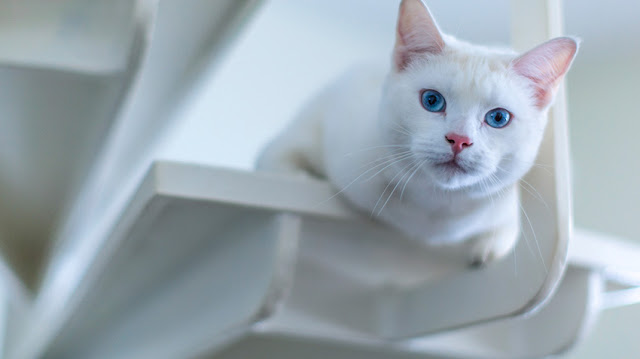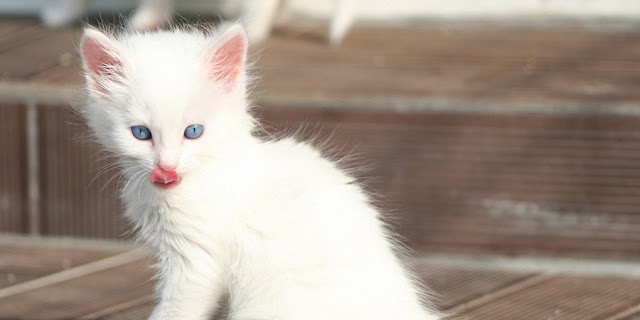The Turkish Angora is a breed of domestic cat. Turkish Angoras are one of the ancient, natural breeds of cat, having originated in central Turkey, in the Ankara regionThe Turkish Angora is a small to a medium-sized cat with an adult male and female weighing 8-11 pounds. Life expectancy of the Turkish Angora is estimated between12-18 years. Turkish Angoras are great house cats and readily accept dogs and other animals, but their assertive natures often make them the "alpha" pet in the household, so be sure to have any existing pets have a meet and greet with your new feline friend.
History
The origins of the Turkish Angora remain a mystery, although longhaired cats have been seen in parts of the Middle East for centuries. Formerly known as "Ankara Cats," in honor of the city of Ankara in Turkey, the name for a particular strain of these longhaired felines was changed to Turkish Angora when the name of the city was changed from Ankara to Angora. Turkish Angoras and other longhaired cats where first introduced to Europe in the late 1500s. The breed came to the United States in the 1700s. Subsequent crossbreeding to other longhaired cats nearly destroyed the breed until in the 1900s, the Turkish government began a breeding program to save the all-white Angora. A pair of cats from this program were imported into the United States, and the breed experienced a resurgence. Although still somewhat rare, the Turkish Angora is growing steadily in popularity. The breed is recognized by the Cat Fanciers Association, The International Cat Association and the American Cat Fanciers Association.
Personality
If you're a dog lover, then you may need to add a Turkish Angora to your family. These cats are elegant, finely-boned creatures with grace, energy and an outgoing personality. They are usually the first to welcome visitors into your home! Turkish Angoras are intelligent which helps them bond well with humans. They are definitely the top pick for families looking to add a cat to their home. It's important to note that while they do love their family, they will feel separation anxiety if left alone for long periods of time. This breed is devoted to its human family and does not do well to be left alone.
What You Need to Know About Turkish Angora Health
All cats have the potential to develop genetic health problems, just as all people have the potential to inherit a particular disease. Run, don’t walk, from any breeder who does not offer a health guarantee on kittens or who tells you that her kittens are isolated from the main part of the household for health reasons. Never buy a kitten from a breeder who does not provide a health guarantee. Turkish Angoras are generally healthy, but white Turkish Angoras with blue eyes are prone to deafness. Odd-eyed white cats may lose hearing in only one ear. Fortunately, deaf cats can get around quite well, but the possibility is something to be aware of.
Some Turkish Angoras may develop a heart condition called hypertrophic cardiomyopathy, which is the most common form of heart disease in cats. It causes thickening (hypertrophy) of the heart muscle. An echocardiogram can confirm whether a cat has HCM. Avoid breeders who claim to have HCM-free lines. No one can guarantee that their cats will never develop HCM. Angoras that will be bred should be screened for HCM, and cats identified with HCM should be removed from breeding programs.
Remember that after you’ve taken a new kitten into your home, you have the power to protect him from one of the most common health problems: obesity. Keeping an Angora at an appropriate weight is one of the easiest ways to protect his overall health. Make the most of your preventive abilities to help ensure a healthier cat for life.
Children and other pets
The Angora who has been well socialized is comfortable with kids, making him a good choice for families who will supervise children to make sure they pet the cat nicely and don’t pull his fur or tail. He is happy to live with cat-friendly dogs, too, as long as they recognize that he’s in charge. Introduce pets slowly and in controlled circumstances to ensure that they learn to get along together.
What's the Turkish Angora like?
The Turkish Angora is very outgoing and will get along with nearly everyone -- even dogs! The Angora will quickly learn your routines and follow you everywhere. They love to climb so don’t be surprised to find them on top of your refrigerator.This breed is definitely a family cat.
Typically they’re a healthy cat; however, Turkish Angoras with a white coat and blue eyes are prone to deafness. Some Angoras could develop a heart condition called hypertrophic cardiomyopathy: the most common form of heart disease in cats.
Here Some Beautiful Photos Of Turkish Angora's:
If You Like, Please Share...




















No comments:
Post a Comment